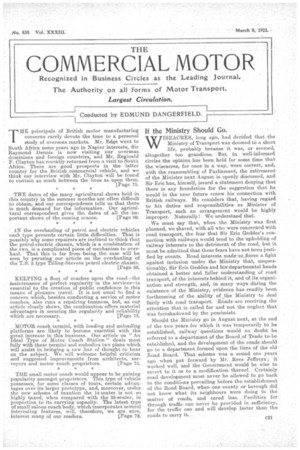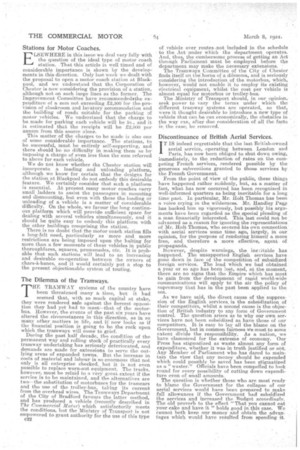If the Ministry Should Co.
Page 1

Page 2

If you've noticed an error in this article please click here to report it so we can fix it.
WISEACRES, long ago, had decided that the Ministry of Transport was doomed to a short life, probably because it was, or seemed, altogether too grandiose. • But, in well-informed circles the opinion has been held for some time that the wiseacres, for once in a way, were correct, and, with the reassembling of Parliament, the retirement of the Minister next August is openly discussed, and Sir Eric has, himself, issued a statement denying that there is any foundation for the suggestion that he would in the near future renew his connection with British railways. He considers that, having regard to his duties and responsibilities as Minister of Transport, such an arrangement would be highly improper. Naturally! We understand that.
We must say that, when the Ministry was first planned, we shared, with all who were concerned with road transport, the fear that Sir Erie Geddes's connection with railways would tend to the upholding of railway interests to the detriment of the road, but it must be admitted that these fears have not been justified by events. Road interests madeso,fierce a fight against inclusion under the Ministry that, unquestionably, Sir Eric Geddes and his' departmental heads obtained a better and fuller understanding of road transport, of the interests behind•it, and of its organization and strength, and, in many ways during the existence of the Ministry, evidence has readily been forthcoming of the ability of the Ministry to deal fairly with road transport. Roads are receiving the attention that is called for and not the neglect that was foreshadowed by the pessimists.
Should the Ministry go in August next, at the end of the two years for which it was.temporarily to be established, railway questions would no doubt be referred to a department of the Board.of Trade to be established, and the development of the roads should go to a department formed upon the lines of the old ,Road Board. That scheme was a sound one years• ago when put forward by Mr. Rees Jeffreys; it worked well, and the Government would be wise to revert to it or to a modification thereof. Certainly road development must never be allowed to go back to the conditions prevailing before the establishment of the Road Board, when one county or borough did not know what its neighbours were doing in the matter of roads, and cared less. Facilities for through traffic can never be provided in sufficiency, for the traffic can and will develop faster than the roads to carry it.
Stations for Motor Coaches.
ELSEWHERE in this issue we deal very fully with the questions of the ideal type of motor coach station. That this article is well timed and of considerable importance is shown by the developments in this direction. Only last week we dealt with the proposal to open a motor coach station at Blackpool, and we understand that the Corporation of Chester is now considering the provision of a station, although not on such large lines as the former. The Improvement Committee have recommended ithe. expenditure of a sum not exceeding £2,500 fer the provision of cloakroom and lavatory aocommodation and the building of roads suitable for the parking of motor vehicles. We, understand that the charge to be made for parking each vehicle will be 5s., and it is estimated that the receipts will be £2,000 per annum from this source alone.
This matter of the charges to be made is also one of some considerable importance. The stations, to be successful, must be entirely self-supporting, and there should be no difficulty in making them so by imposing a charge of even less than the sum referred to above for each vehicle.
We do not know whether the Cheater station will incorporate a loading and unloading platform, although we know for certain that the designs for the station at Blackpool do not embody this desirable feature. We certainly consider that such aplatform is essential. At present. many motor coaches carry small ladders to assist the passengers in mounting and dismounting, but even with these the loading or unloading of a vehicle is a matter of considerable difficulty. On the whole, we favour the long continuous platform which will provide sufficient space for dealing with several vehicles simultaneously, and it should be quite easy to embody this platform with the other buildings comprising the station.
There is no doubt that the Motor coach station fills a long-felt need, particularly as more and more restrictions are 'being imposed upon the halting for more than a few moments of these vehicles in public thoroughfares, squares, promenades, etc. It is probable that such stations will lead to an increasing and desirable co-operation between the owners of chars-h-bancs, and it would certainly put a stop to the present objectionable system of touting.
The Dilemma of the Tramways.
THE TRAMWAY systems of the country have been threatened many a time, but it. had seemed that, with so much capital at stake, they were rendered safe against the fiercest opposition they had yet had to meet—that of the motorbus. However, the events of the past six years have altered the circumstances in this direction, as in so many other matters in life, and itnow looks as if the financial position is going to be the rock upon which the tramways will come to grief.
During the past half decade, the condition of the permanent way and rolling stock of practically every tramway undertaking has seriously deteriorated, and demands are made for extensions to serve the outlying areas of expanded towns. But the increase in
– costs of material and labour is so enormous that not only is all enterprise checked, but it is not even possible to replace worn-out equipment. The tracks, however, must be relaid to a very great extent if the service is to be maintained, and the alternatives are two—the substitution of motorbuses for the tramcars and the use of the trolley-bus, taking its current from the overhead wires. The Tramways Department of the City of Bradford favours the latter method, and has produced a vehicle (recently described in The Commercial Motor) which satisfactorily meets the conditions, but the Ministry of Transport is not empowered to grant authority for the use of this type
of vehicle over routes-not included in the schedule to the Act under which the department operates. And, thus, the cumbersome [process of getting an Act through Parlia.ment must be employed before the department may make the necessary extensions. The Tramways Committee of the City of Chester finds itself on theehorns of a dilemma, and is seriously considering the introduction of the motorbus, which, however, would not enable it t& employ its existing electrical equipment, whilst the cost per vehicle is almost equal for motorbus or trolley-bus. The Ministry' of Transport should, in our opinion. seek power to vary the terms under, which the different tramway systems are operated, so that, were it thought desirable to introducea new type of vehicle that can be run economically, the obstacles in the way can, after due consideration of all the facts in the ea-se; be removed.
Discontinuance of British Aerial Services.
IT IS indeed regrettable that the last British-awned aerial service, operating between London and Paris, has now been obliged to shut down owing, immediately, to the reduction of rates on the competing French services, rendered possible by the generous subventions granted to those services by the French Government. .
From the point of view of the public, these things -have happened rather suddenly, but, as a matter of feet, what has now occurred has been recognized hi well-informed quarters as being inevitable for a long time past. In particular, Mr. Holt Thomas has been a voice crying in -the wilderness. Mr. Handley Page has backed him up vigorously, but possibly his argunients have been regarded as. the special pleading of a. man financially interested. This last -could not be advanced as a reason for ignoring the representations of Mr. Holt Thomas, who severed -his own connection with aerial services some time ago, largely, in our opinion, for the purpose of rendering himself a more free, and therefore a more effective, agent of propaganda. however, despite warnings, the inevitable has happened. The unsupported English services have gone down in face of the competition of 'subsidized foreign services. The lead which we had obtained a year or so ago has been lost, and, at the moment, there are no signs that the Empire which has most to gain from thedevelopment of rapid world-wide communications will apply to the air the policy of supremacy that has in the past been applied to the sea.
As we have said, thedirect cause of the suppression of the English services is the subsidization of their competitors, whilst a second cause is the objection of British industry to any form of Government control. The question arises as to why our own services have not been subsidized as have those of our competitors. It is easy to lay all the blame on the Government, but in common fairness we must to some extent divide the responsibility. As a nation, we have elamoUred for the extreme of economy. Our Press has stigmatized as waste almost any form of expenditure, whether it was in truth justified or not. Any Member of Parliament who has dared to maintain the view that any money Should be expended which could possibly be saved has been stigmatized as a "waster." Officials have been compelled to look round for every possibility of cutting down expenditure even of small amounts.
The question is whether those who are most ready to blame the Government for the collapse of our aerial services would have been prepared to make full allowances if the Government had subsidized the services and increased the Rudget accordingly. The old proverb to the effect "That you cannot eat your cake and have it "holds good in this case. We cannot both keep our money and obtain the advantages which would have resulted from spending it.
































